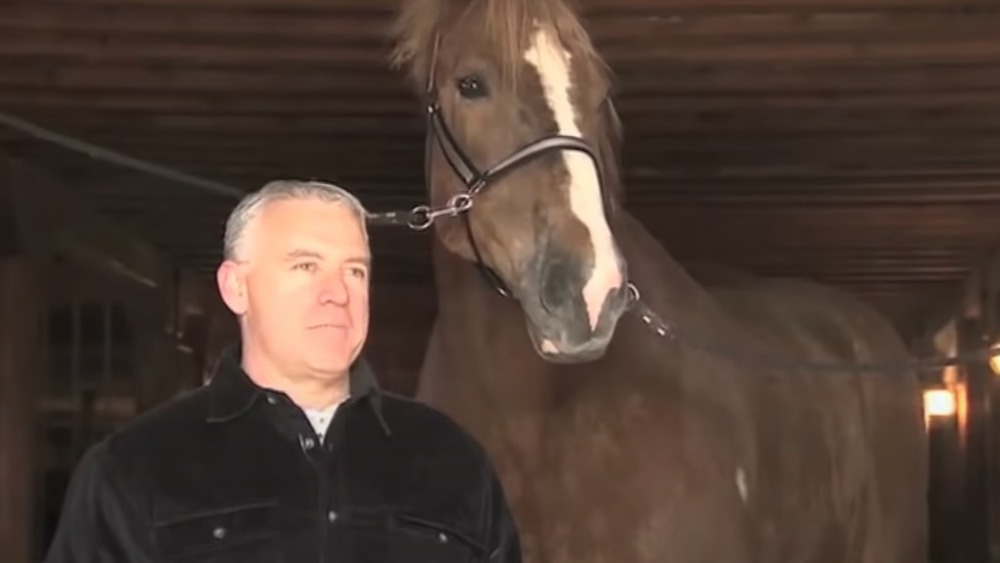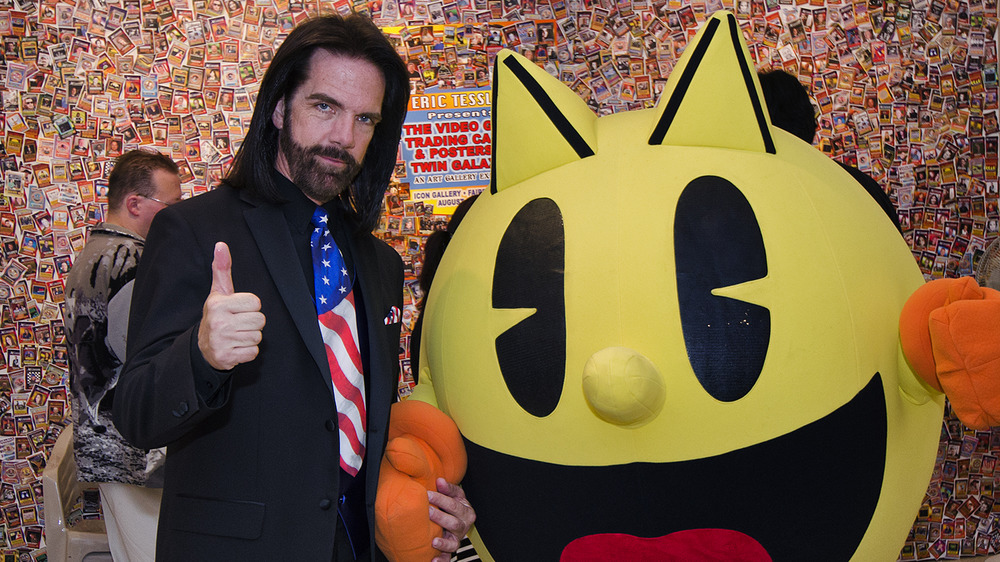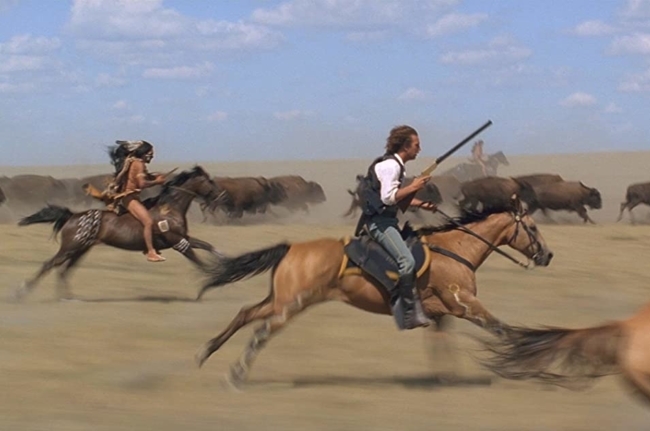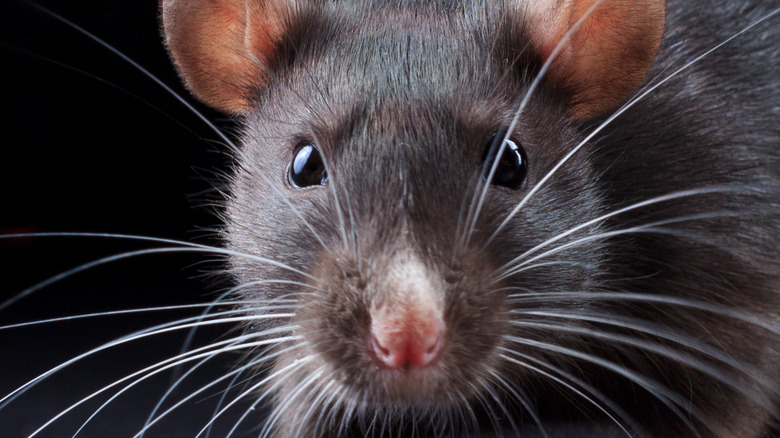
Guinness World Records That Are No Longer Accepted
Appropriately enough, the Guinness Book of World Records was born as a way to resolve a drunken bet. According to the record book itself, the managing director of beer company Guinness in the 1950s, Sir Hugh Beaver, was attending a hunting trip when he and his companions got into an argument over what the fastest game bird in Europe was. Failing to find the answer to that very specific question in any handy reference books, Beaver made it his mission to ensure that no one else would suffer defeat at trivia night at the pub ever again. He hired a pair of researchers, twins Norris and Ross McWhirter, to compile an authoritative guide to everything noteworthy and basically left them to it.
As History Today notes, the McWhirters applied their impressive eye for detail and created a legacy that would set its own records as a best-seller — the Guinness Book of World Records. But though Guinness logs a whole lot of records today, adding categories and entries regularly, there are also many it has discontinued over the years. Let’s take a look at some of the records Guinness no longer accepts.
Going without sleep
Among the reasons Guinness stops tracking records is to avoid encouraging reckless or dangerous behavior, whether the danger is to yourself or others. Frequently, records stop being monitored to stop people from doing stupid stuff to get recognition. Stupid stuff like staying awake for more than 11 days, which is what you’d have to do to earn the “going without sleep” record…if it was still awarded.
The current (and likely permanent) Guinness record holder for “time awake” is American Randy Gardner, who, according to BBC Futures, came up with the idea to stay awake as long as possible as a high school science project. On Jan. 8, 1964, he set the record by successfully avoiding sleep for 264 consecutive hours — that’s 11 days and 25 minutes, as NapCloud notes. He was just 17 at the time.
A sleep researcher from Stanford eventually got involved partway through Gardner’s experiment, and the teen suffered no long-lasting effects, as he recalled in an NPR interview decades later. But during the actual stunt, he pretty much went nuts — unable to recall simple details and feeling like he’d given himself a form of dementia. It’s those dangers — and the fact that you could inadvertently hurt someone else while in your sleep-deprived state — that led Guinness to discontinue the record, as it goes against their safety guidelines. One attempt after Gardner’s, that by Finn Toimi Soini, was removed in 1989 over those concerns, as the Irish Independent notes.
Gluttony (AKA general eating)
Some feats of human endeavor are tracked in certain ways, but not others. For example, Guinness still keeps very specific eating-related records but has discontinued or even banned others. In the Food and Drink category, Guinness lists records like heaviest foods, largest foods, and largest food-related collections. And as Insider notes, there are some wild records there, too, like “most grapes eaten using the feet in 3 minutes,” set by Kaif ali Khan in 2018.
But although Guinness still keeps up on some speed-eating competitions, including the infamous Nathan’s Famous Hot Dog Eating Competition, it no longer accepts records for “general gluttony,” also known as just plain overeating. Again, this is related to the company’s policy on minimizing potential harm to record-seekers — it’s just not safe to see how many calories you can consume daily for an extended period! Guinness dropped the “gluttony” category in 1989, as the Associated Press reports.
The elimination of these categories left Eddie “Bozo” Miller as possibly the world’s greatest consumer of calories on the regular, as his 2008 obituary relates. SFGate notes that he ate 25,000 calories a day at one point in his life, a feat that’s definitely not for the faint of stomach.
Binge drinking
Similarly to records for gluttony, Guinness no longer awards records for binge drinking — even if what you’re drinking is a keg of Guinness stout! Certain drinking-related feats are still recorded, such as “most pubs visited,” as included in the Food and Drink category. But in 1991, out of concern about rising alcohol abuse rates, the company decided to retire many of its alcohol-related records, as CalWineries notes.
Under the earlier rules, the amount of a certain potent potable you consumed in one sitting could get you into the record books. For example, the company points out that 23-year-old Jack Keyes of Londonderry, Northern Ireland, held the 1969-70 record for pints downed, drinking 36 pints in 60 minutes in Blackpool, Lancashire, England, in 1969. This and other drinking-related records like “highest documented blood alcohol content” and “fastest beer drinking relay” will never be topped — at least in the Guinness Book of World Records. Guinness itself states that no speed-drinking records will ever again be accepted out of public health interest.
Hunger strikes or fasting
To go totally opposite to gluttony, Guinness also no longer records the longest hunger strike or period of fasting…again, doing so isn’t really in the best interest of the person getting the record. As the company puts it, “This is such a sensitive and difficult area to monitor, we do not accept public applications for this category.” While the publicly documented 16-year hunger strike endured by Indian women’s rights activist Irom Sharmila received global recognition, as The Guardian reports, due to the very political nature of such protest activism, the record-monitoring body typically declines to get involved in any way.
Non-protest fasts and diets, meanwhile, are right out — awarding recognition for such attempts can promote dangerous eating disorders like anorexia, and no one wants to do that, especially in a record book that’s supposed to be all in good fun, recording the highlights of nature and human endeavor — and the weird pastimes of our fellow humans.
Heaviest pets
Humans aren’t the only ones Guinness is trying to keep safe and healthy! Pets, too, get some level of protection in the kinds of records that the company keeps. Just like it’s trying not to encourage overeating or obesity among its human readers, Guinness tries to make sure no one force-feeds their pet — or just plain allows them to get dangerously chunky on their own.
The company notes that it discontinued the “heaviest pet” record in 1998 out of concern that people would manipulate the system and endanger their pets at the same time. But don’t worry — if you have a simply massive animal following you around, you can still get recognized! The company points out that it does still keep some pet records — “We still measure height, length and age for most animals and pets.” For example, the largest cases of various species and breeds are still tracked, such as the tallest horse (Big Jake, who’s nearly 7-feet tall at the shoulder). And if your pet happens to have a weird and wonderful talent, they can still be honored — Guinness has records for the most tricks performed by a rabbit in one minute (the very talented Taawi) and, as DogTime relates, the longest human tunnel traveled by a dog on a skateboard (Otto the bulldog’s 30-person run).
Cruelty to animals
Guinness knows that human nature can be fickle and a little cruel — after all, they discontinued the “heaviest pets” categories just in case someone actively encouraged their pet to become dangerously obese.
But letting Rover have all the snacks he wants in the hopes that he’ll become chubby enough to set a record isn’t where everyone draws the line. Sadly, humans are not always kind to their domesticated animal buddies. They’ve been forced into some pretty inhumane sports over the centuries, and Guinness wants no part in continuing that. So it no longer tracks so-called “accomplishments” in a wide range of animal-related sports that can be considered cruelty to animals.
Examples of these activities include, as Guinness points out, fox hunting, where early records were kept for things like largest fox killed, most people on an organized hunt, and so on. Other banned animal-related records include cock fighting and bull fighting. One particularly controversial record attempt was by an 11-year-old Mexican boy who claimed the title of world’s youngest bullfighter — going against several Guinness rules at once, all related to children and animals, as The Telegraph relates. Another category that’s banned from the book, as PETA recounts, is elephant polo. Yes, that is apparently a thing people do.
Child-endangering records
You can’t be cruel to an animal and get rewarded by Guinness, and you can’t encourage a kid to do something reckless or illegal, either. If an activity might harm a child or it’s illegal for a child to do in that kid’s area of residence, it can’t become a record, as the company highlights in its rules. That makes officiating the “world’s youngest” categories something of a challenge for the editors and record monitors at the publication. The company does still accept applications for quite a few “youngest” records, but notes that “Guinness World Records does not generally recognize endurance records for those aged 16 or under.” So that rules out activities like “longest distance run by a 5-year-old” or possibly even “longest temper tantrum by a toddler,” a category most parents would surely nominate their kid for.
Other feats, however, are very welcome! For example, your very talented junior drummer could take on 4-year-old American Julian Pavone, who performed his 20th official concert in 2009 at that tender age, as Guinness highlights. Or perhaps you have a circus ringmaster under the age of 3, which is when Cranston Chipperfield of England made his official debut, according to Guinness.
Illegal high-speed driving records
Once again, safety comes into play in determining which records get to stay in the book — today, there are no more Guinness World Records for driving dangerously! In the past, a variety of driving feats were recorded, notably high-speed competitions that didn’t take place on a dedicated track. For example, cannonball runs, where drivers compete to see who can cross a certain area (usually a country) fastest are no longer allowed, as they can cause serious danger to the drivers and others on the road. The company notes that it stopped tracking “high-speed circumnavigations,” as it calls the category, in 1996. It was just too dangerous — and too open to legal consequences — to celebrate achievements that likely involved breaking national speed laws.
Guinness does, however, still keep track of both closed-circuit driving challenges and fuel economy runs, such as a 2018 record set by students at Duke University for the world’s most fuel-efficient car. Cannonball runs and high-speed cross-country driving does still take place, but Guinness does not acknowledge or report on it. As the Daily Mail reports, less traffic on the roads during the coronavirus pandemic enabled certain stunt drivers to make a New York to Los Angeles run in record time in 2020, crossing the United States in 25 hours and 39 minutes at an average speed of 112 mph — very much illegal and very much what Guinness doesn’t want to promote in its pages.
Being buried alive
Yeah, yet again, let’s say this out loud for the people at the back — don’t do dumb things in pursuit of a record, okay? Guinness removed its “buried alive” record after several ill-fated attempts ended in serious health consequences or even death for the hopeful contenders.
This was, nonetheless, a legitimate record back in the 1960s and 70s, when it was held by Mike Meaney, as British Pathe documents in a nifty vintage video. He spent 61 days underground and became a local celebrity in Ireland for the feat, as The Journal relates. But Guinness stopped recognizing this stunt in the 1990s, as hopeful Englishman Geoff Smith learned after the company declined to validate his three months spent buried in a pub garden in 1998. BBC News points out that Smith was disappointed but still glad to have reclaimed bragging rights for his family even if they weren’t official — the previous European record was held by his own mother.
But it’s not all fun and games, as The Mirror points out – a 24-year-old Sri Lankan man died while making his own attempt in 2012. The incident points out the dangers of many endurance or human ability records, which is why Guinness is so careful about which claims it’s willing to accept.
Excessively specific records
It’s called Guinness World Records for a reason! Although the company originally looked separately at the various countries within the United Kingdom — England, Scotland, Wales, and Northern Ireland — it no longer does so. As the company points out, when it expanded to become an international endeavor, Guinness stopped keeping track of country-specific or regional records.
That also means that “excessive qualifications” are also outside the purview of the Guinness Book of World Records. Is something notable just because it’s done by a person with a disability? Nope, doesn’t qualify, according to the official rules. Is it too specific and not likely to “create international competition,” as the company puts it? Your application will likely be rejected. But given that there are some highly specific categories, you may still be okay! For instance, as Insider notes, you could plank for more than eight hours or watch a single movie more than 100 times. Not specific enough for you, but still within Guinness guidelines? Try taking on a record like “most apples held in own mouth and cut by chainsaw in one minute.” As Good Housekeeping reports, you’d need to successfully saw through eight without lopping off your nose.
Flying lantern or balloon releases
Oh, Guinness — you’re so fun and yet so responsible! In the pursuit of world records, Guinness doesn’t want to encourage environmentally irresponsible behavior, just like it doesn’t want to put either humans or animals in clear and present danger when trying to pull off a stunt. That means nothing environmentally challenging, says the company. Examples of records that existed in the past and don’t today because of environmental concerns include flying lantern and balloon releases. Letting zillions of paper lanterns or balloons soar uncontrolled can create pollution or choke animals when they come back to earth, as the Environmental Nature Center points out.
And small wonder Guinness wouldn’t want to be associated with such things after the disaster that was a 1986 charity fundraising stunt in Cleveland. “Balloonfest 86” involved the release of more than 1.5 million balloons — and, as Ultimate Classic Rock recounts, it almost immediately threw the city into chaos. Distracted drivers crashed, an airport shut down, and the Coast Guard was unable to save two lost fishermen due to the sheer amount of balloons littering Lake Erie. The destruction caused by the event led to the company banning this record a few years later.
Video game high scores
Guinness no longer actively monitors video game high scores, as it points out in its rules, though it still awards records for the first person to achieve a perfect score in a certain game and for other video gaming excellence. Got a lot of followers for your livestreams? Take on the record for “most subscribers to a female games broadcaster on YouTube,” currently held by Ihascupquake with more than 5 million subs. Or perhaps you want to challenge Dan White in Red Dead Redemption to see if you can beat his “time to ride a donkey” of 11 minutes 7 seconds.
Of course, records in the “Gaming” category haven’t been without controversy, as it’s pretty easy to cheat on classic arcade games with modern technology — that’s one of the reasons Guinness stopped recording high scores. CBR.com recounts that one former record holder actually had his records removed then reinstated after more than two years, after allegations that he’d cheated using an emulator. Gamer Billy Mitchell, known for his Donkey Kong and Pac-Man prowess, was stripped of his records after a company investigation, then had them reinstated after an audit by Guinness. However, the controversy was part of the reason the company chose to discontinue the high-score record category – it’s just not worth the arguments.

Why Some Scientists Believe The Earth Was Once Purple

How Much It Costs To Be Buried Near Marilyn Monroe

The Truth Behind The Brazilian Island Where Giving Birth Is Forbidden

Here's Why Denmark Celebrates America's Independence Day Every Year

Philip Snider Murdered His Wife. Here's How He Was Finally Caught

The First People To Climb The World's Tallest Mountains (Besides Everest)

The Truth About Jean-Claude Van Damme's Affair With Kylie Minogue

The Truth About Agatha Christie's Disappearance

The Truth About Humanity's Oldest Story

The Truth About The World's Most Expensive Chicken



































